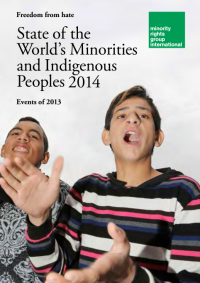Report by MRG on the consequences of ignoring global hate crimes against minorities and indigenous people
Minority Rights Group International (MRG) has released a flagship report, State of the World's Minorities and Indigenous Peoples 2014, which focuses on ‘freedom from hate' and which presented compelling evidence showing that hate crimes and hate speech are prevalent in all regions of the world.
 MRG stresses in the report that “hate crime towards minorities and indigenous peoples is a daily reality in many countries across the globe, but is often ignored by authorities.” MRG indicates that governments continue to ignore, under-report and often leave hate crimes unchecked, which further generate escalating violence against minorities. The organization believes that such lack of responsiveness from the government makes it easier for perpetrators to continue their unlawful actions.
MRG stresses in the report that “hate crime towards minorities and indigenous peoples is a daily reality in many countries across the globe, but is often ignored by authorities.” MRG indicates that governments continue to ignore, under-report and often leave hate crimes unchecked, which further generate escalating violence against minorities. The organization believes that such lack of responsiveness from the government makes it easier for perpetrators to continue their unlawful actions.
The report finds that targeted violence often has a purpose. Anti-migrant rhetoric in Greece or sectarian violence in India serves to consolidate the power base of extremist organizations. Negative representations of indigenous groups in Guatemala or Uganda may provide justification for further exclusion or eviction from ancestral lands. MRG also explains the driving force behind hate crimes in the Democratic Republic of Congo, Central African Republic, South Asia, Burma, Russia, Pakistan and many others, and provides examples of the impact it had on the communities in those specific countries.
The State of the World's Minorities and Indigenous Peoples 2014 report not only unveils the truth behind the levels of violence, harassment and verbal abuse across the world, but it also includes many examples of how hatred is being countered by legislators, politicians, journalists, and communities, by addressing the root causes. The report indicates some steps towards progress, highlighting initiatives and plans of countering hate crimes around the world.

The report also mentions the Endorois case. The International Network for Economic, Social and Cultural Rights’ (ESCR-Net) Working Group on Strategic Litigation has worked with the Endorois Welfare Council (EWC), MRG and NGOs in Kenya and Latin America, including KHRC, KLA, Dejusticia and CEMIRIDE, for the implementation of the 2010 recommendations of the African Commission on Human and Peoples' rights on the Endorois case since 2012. For more information on this case, please click here.
To read the press release, please click here.
To download the report, click here.
